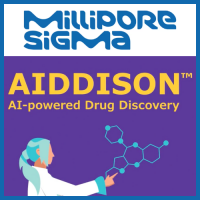MilliporeSigma Launches First Ever AI Solution to Integrate Drug Discovery and Synthesis
 MilliporeSigma, the U.S. and Canada Life Science business of Merck KGaA, Darmstadt Germany, a leading science and technology company, today launched its AIDDISON™ drug discovery software, the first software-as-a-service platform that bridges the gap between virtual molecule design and real-world manufacturability through SynthiaTM retrosynthesis software application programing interface (API) integration.
MilliporeSigma, the U.S. and Canada Life Science business of Merck KGaA, Darmstadt Germany, a leading science and technology company, today launched its AIDDISON™ drug discovery software, the first software-as-a-service platform that bridges the gap between virtual molecule design and real-world manufacturability through SynthiaTM retrosynthesis software application programing interface (API) integration.
It combines generative AI, machine learning and computer-aided drug-design to speed up drug development. Trained on more than two decades of experimentally validated datasets from pharmaceutical R&D, AIDDISON™ software identifies compounds from over 60 billion possibilities that have key properties of a successful drug, such as non-toxicity, solubility, and stability in the body. The platform then proposes ways to best synthesize these drugs.
“With millions of people waiting for the approval of new medicines, bringing a drug to market, still takes on average, more than 10 years and costs over US$2 billion1” said Karen Madden, Chief Technology Officer, Life Science business sector of Merck. “Our platform enables any laboratory to count on generative AI to identify the most suitable drug-like candidates in a vast chemical space. This helps ensure the optimal chemical synthesis route for development of a target molecule in the most sustainable way possible.”
Discovering drugs is a long, iterative process. Only about 10% of drug candidates evaluated in Phase I made it to market2. To find the most suitable chemical compound from a universe of more than 1060 molecules3 requires significant time, resources, and expertise. Artificial Intelligence (AI) and machine learning models like AIDDISON™ software can extract hidden insights from huge datasets, thus increasing the success rate of delivering new therapies to patients. AI has the potential to offer more than US$70 billion in savings for the drug discovery process by 2028, and to save up to 70% time and costs for drug discovery in pharmaceutical companies4.
- Combines generative AI, machine learning and computer-aided drug-design to increase the success rate of new drugs and therapies
- Virtually screens compounds from a universe of >60 billion chemical targets and evaluates synthesis routes for safer, cost- effective, higher-yield drug manufacturing
- Recommends chemicals, reagents and building blocks for synthesis
1 https://pubmed.ncbi.nlm.nih.gov/32270704/
2 https://www.sciencedirect.com/science/article/pii/S2211383522000521
3 https://pubs.acs.org/doi/10.1021/ar500432k
4 https://bekryl.com/industry-trends/ai-artificial-intelligence-in-drug-discoverymarket-size-analysis
Article from sigmaaldrich.com.
MilliporeSigma
-
Rachel Bloom-Baglin
- December 05, 2023
- 978-436-1725
- Send Email

